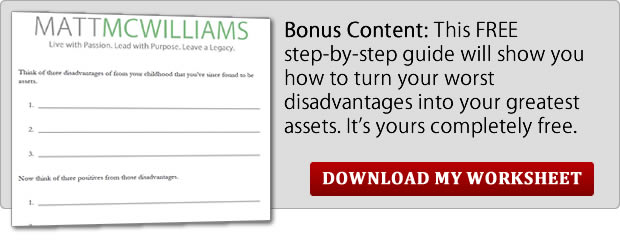Do you ever hear the voices?
The voices that say you’re too old or too young, too plain or too pretty, too this or too that. You’ve failed too much, started too late, grew up too poor, or you’re inadequate in some way. The voices tell you that your disadvantages will always be just that…disadvantages. They will always hold you back and keep you from unleashing the World Changer that you are.
But what if you could turn your worst disadvantages into your biggest advantages? Yes, even the ones that have haunted you for years, kept you up at night, and crippled your development.

What if you could turn your worst disadvantages into your biggest advantages? (Tweet That) | Share this Graphic on Pinterest | Share on Facebook
13 moves in 14 years
When I was growing up, I moved 13 times by the age of 14. And not just across town either. I lived in 11 different cities and went to 8 different schools.
I felt like life was out to get me. I never stayed in the same school for more than one year. As a result, I never had a friendship last more than one year. The three years I actually stayed in the same city and house from 4th to 6th grade, my best friend moved after 5th grade and I was rezoned for 6th. The bad breaks would almost comical if it weren’t for the pain that it caused at the time.
I felt lonely, isolated, and always the outsider. I never felt rooted. But…
My worst disadvantage turned into one of my biggest assets.
| Bonus Content: This process isn’t easy. That’s why I created a FREE step-by-step guide to show you how to systematically turn your worst disadvantages into your biggest assets. Look for this free worksheet at the end of this post. |
Today, I am comfortable with change. I find it easy to make new friends. I adapt easily to new situations and places.
At the age of 35, I’ve finally settled down. We’ve lived in our current home longer than I’ve ever lived in one place (more than three years). But the lessons I learned growing up still remain.
Examples of turning disadvantages into assets
As I thought through my life, I found numerous examples of turning disadvantages into big assets.
Disadvantage: I started golf later than my peers. I started at age 14 when most of the competition had been playing for more than five years.
Advantage: I had to focus more to catch up. I was comfortable jumping into new things. I was never afraid of being behind.
Disadvantage: I spent most of my time alone growing up, without adult supervision.
Advantage: When I got to college, I was practically the only one who knew how to do laundry. Or cook. Or use a vacuum. I was self-sufficient while others still relied on their parents.
Disadvantage: When I first got into the insurance business, I didn’t know the industry at all.
Advantage: It was easy for me to think outside of the box. Most of my ideas were revolutionary in the industry and played a big role in helping us grow as fast as we did.
History has tons of examples of revolutionaries who simply didn’t know any better. They didn’t know what was allowed and what wasn’t. So they did it their way…and they made history.
Examples from history
Sylvester Stallone
When Stallone’s mother was in labor, the doctors were forced to pull him out using forceps. Their misuse accidentally severed a nerve in his face causing permanent paralysis. The lower left side of his face has been paralyzed since birth.
I’m sure that he was made fun of as a child because of his stone face and slurred speech. He was probably self-conscious and at times wished he’d never faced this problem.
But the result is his trademark look and slightly slurred speech. Can you even imagine Rocky without that look and voice?
Derrick Coleman
You may remember him as the Seattle Seahawks fullback from the inspiring Duracell commercial. In it, he said:
They told me it couldn’t be done, that I was a lost cause. I was picked on and picked last. Coaches didn’t know how to talk to me. They gave up on me. Told me I should just quit. They didn’t call my name. Told me it was over. But I’ve been deaf since I was 3, so I didn’t listen.
Think about that…deafness could be a barrier, but what is crowd noise to Derrick Coleman? Nothing. It doesn’t affect him like it does other players. He was able to turn a disadvantage into a huge asset.
Darin Sargent
Darin is a new friend of mine.
Darin was born with only one hand. Here’s what he writes about it:
I have been born with a unique gift of having only one hand and it has helped me see life from a different perspective than most. I believe what you read on my blog and in my books will reveal that to you and in some way help you with the challenges that life seems to often bring our way.
I don’t know what Darin would be doing today if he had two hands. But I do know this…that when he walks into a room full of antsy teenagers to tell them that they can overcome obstacles, two-handed Darin doesn’t stand a chance. One-handed Darin, on the other hand, commands immediate attention.
Peter Falk
You know him as Columbo. And you know him for that trademark squint.
Like Stallone, his trademark came about at an early age. When he was three, he was diagnosed with retinoblastoma and his right eye was removed. That artificial eye caused his famous squint.
Even after some early success on stage, he was told by Harry Cohn at Columbia Pictures, “For the same price I can get an actor with two eyes.” I’m guessing ol’ Harry regrets that comment.
Reframing disadvantages
Sylvester Stallone could have dwelled on his disadvantage and never acted.
Derrick Coleman could have given up on his dream of playing football because being deaf made it harder. Today, he plays in the loudest stadium in the NFL.
Darin Sargent could have focused on all the things he can’t do with only one hand. Instead he turned that missing hand into a conversation starter.
Peter Falk could have let that one voice sink in. That voice that said he is worth less than someone with two eyes, that he is inferior or inadequate. Instead, he has one of the most recognizable faces in Hollywood.
All of them did what I am telling you to do:
They reframed their disadvantages.
They stopped dwelling on the disadvantage itself and everything they couldn’t do and they dwelled on the positive aspects of it. They dwelled on what it made possible.
What are your disadvantages?
What disadvantages have you carried around for too long?
What obstacles have you allowed to remain in your way?
What adversities are you still living in?
The key to turning your advantages into assets is in what you choose to focus on. What do you choose to meditate on?
I wasted countless years focused on all of the disadvantages in my life. I literally wasted that time. When all along, if I’d only looked closely enough, I would have seen that they could have been my biggest assets.
The free worksheet I’ve put together for you will walk you through the steps to turn your worst disadvantages into your greatest assets.
What disadvantage have you turned into a big advantage in your life?
|
|
Questions?
Text me anytime at (260) 217-4619.
Or…check out some of my free reports to help you get on the right track:
 |
 |
 |
 |
 |
 |
 |
 |
 |
